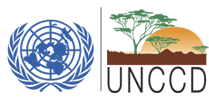While not offering a silver bullet, a land-based approach involving increased investment in land rehabilitation for frontline villages and communities would be “cheaper and more effective than investing in walls, wars and relief,” stressed UN Convention to Combat Desertification (UNCCD) Executive Secretary Monique Barbut at a UN Security Council briefing in New York, US on 26 May 2016.
The briefing aimed to enhance understanding of the security implications of climate change in the Sahel and was addressed by representatives of more than 15 countries, intergovernmental and non-governmental organizations.
 26 May 2016: While not offering a silver bullet, a land-based approach involving increased investment in land rehabilitation for frontline villages and communities would be “cheaper and more effective than investing in walls, wars and relief,” stressed UN Convention to Combat Desertification (UNCCD) Executive Secretary Monique Barbut at a UN Security Council briefing in New York, US on 26 May 2016. The briefing aimed to enhance understanding of the security implications of climate change in the Sahel and was addressed by representatives of more than 15 countries, intergovernmental and non-governmental organizations.
26 May 2016: While not offering a silver bullet, a land-based approach involving increased investment in land rehabilitation for frontline villages and communities would be “cheaper and more effective than investing in walls, wars and relief,” stressed UN Convention to Combat Desertification (UNCCD) Executive Secretary Monique Barbut at a UN Security Council briefing in New York, US on 26 May 2016. The briefing aimed to enhance understanding of the security implications of climate change in the Sahel and was addressed by representatives of more than 15 countries, intergovernmental and non-governmental organizations.
Noting that close to 60 million people could migrate to North Africa and Europe by 2035, due to the desertification of sub-Saharan Africa, Barbut proposed investing the equivalent of US$250 a hectare for land rehabilitation and sustainable land management in 5,000 frontline villages and communities in each Sahelian country “to kick start a new economy” and build resilience to climate change.
Barbut’s presentation drew on her visit to the two cities of Agadez and Dirkou in northern Niger, where an estimated 150,000, mostly young, rural inhabitants, pass through each year, in search of a better life. She described the transformation of the two cities from tourist hotspots and trading centers to major migrant transit points, where people smuggling has become “the only viable economic activity.” Barbut pointed out that the opportunity for coherent action in the Sahel “appears to be closing quickly,” creating a breeding ground for disillusionment, crime, radicalization and conflict, and stressed that “natural resources cannot be a last minute add on to our security strategy.”
Other speakers included Jean-Paul Laborde, Executive Director of the Counter-Terrorism Committee Executive Directorate, who emphasized that climate change was an “aggravator” of conflict and violent extremism in the region, in addition to poor governance and corruption, porous borders, economic instability and unemployment. The Special Representative of the UN Secretary-General for West Africa and Head of the UN Office for West Africa, Mohamed Ibn Chambas, highlighted the drying up of sections of the Niger River as one of the regional examples of the effects of climate change. He cited some related threats, including the renewed insurgency in the Niger delta, terrorist activities in northern Mali, and deadly conflicts over resources as well as organized crime, trafficking and violent extremism across the region.
Hindou Omuarou Ibrahim, Coordinator of the Association for Indigenous Women and Peoples of Chad, observed that climate change and desertification have become part of the daily lives of the Sahelian people and are a major cause of instability and insecurity. Noting that many species of animals and plants have disappeared, she emphasized that competition over resources was leading to a situation where only the fittest could survive.
To address these issues, the Global Mechanism of the UNCCD is coordinating the EU-funded Front Local Environmental pour une Union VertE (FLEUVE) project that aims to contribute to the integration of sustainable land management in local development plans by investing in micro-projects in five Sahelian countries (Burkina Faso, Chad, Mali, Niger and Senegal), with complementary regional-level activities to strengthen capacity building, the dissemination of good practices and innovative financing. The project is implemented under the auspices of the Great Green Wall of the Sahara and the Sahel Initiative (GGWSSI), which was launched by the African Union in 2007 and has mobilized nearly 20 countries to contribute to, among other actions, the restoration of millions of hectares of degraded land through farm-based regeneration of indigenous tree species.
At the 21st session of the Conference of the Parties (COP 21) to the UN Framework Convention on Climate Change (UNFCCC), world leaders and heads of major international agencies pledged US$4 billion by 2020 to scale up GGWSSI implementation. [UNCCD Press Release] [UNCCD Briefing (in French)] [UN Press Release] [IISD RS Story on First Great Green Wall Global Conference] [UNCCD/GM Website on the GGWSSI Project] [GGWSSI Website]